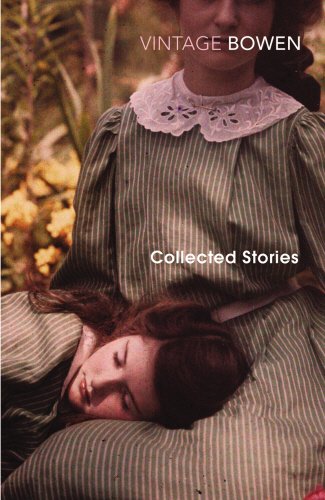
('You were like a wishing well' © Gabriela Camerotti, 2007)
A TURNING POINT IN THE COLLECTED STORIES
OF ELIZABETH BOWEN
by MIKE SMITH
The War Years section, towards the end of Elizabeth Bowen’s Collected Stories, includes a pivotal story. With the bulk of the collection now behind, written during the twenties and thirties, the last two sections combined are smaller, and I’m struck by a sense of Bowen’s trajectory being on a downward curve. Individual stories are strong, but the sense of an ending coming is stronger.
The second story in The War Years section is a departure, an experiment in storytelling that appears nowhere in any of the earlier sections. ‘Oh, Madam…’ is a true wartime story, far more than the preceding ‘Unwelcome Idea’, set in an oddly British, rather than foreign and neutral, Dublin. It’s not time and place, however, that make ‘Oh, Madam…’ so innovative in Bowen’s work, it is her choice of narrative voice, and perspective. This story is, in effect, a monologue. Not merely a first person narrative, it is one half of a dialogue spoken between a housemaid and her returning mistress.
The story begins: ‘Oh, madam… Oh, madam, here you are!’ Even this opening is radically different, for the title is echoed twice in the first four words. I can’t remember seeing another story in this collection, or indeed any other, where this technique is used. To reference a title tends to ‘use it up’ rather than emphasise it. It is often a revelation to reach the reference that will throw the title into sharp meaning, but here is a repetition that we must be reluctant to categorise as ‘mere’. It’s worth noting too, that the title includes those three dots that will come to signal unspoken interjection of the mistress’ words, and their implied meanings.
The house has been blitzed, and Bowen, in the maid’s, not the mistress’ voice, speaks. Sometimes there are no dots, and only from responses to the unspoken words do we guess, perhaps with less certainty than people who lived through the blitz would have guessed, what has been said.
I don’t know what you’ll say. Look, sit down just for a minute, madam; I dusted this chair for you. Yes, the hall’s all right really; you don’t see so much at first – only, our beautiful fanlight gone.
 The subtle introduction to what has happened is remarkable. Only at that fanlight do we get an inkling, which makes us revise our understanding of what we have previously been told, about why, for example, the chair needs dusting. Bowen winds us in to a fuller understanding of what has taken place, exactly as Madam is wound in, with the words of her maid. Even that comma, after ‘only’, signals the hesitation that comes before the revelation.
The subtle introduction to what has happened is remarkable. Only at that fanlight do we get an inkling, which makes us revise our understanding of what we have previously been told, about why, for example, the chair needs dusting. Bowen winds us in to a fuller understanding of what has taken place, exactly as Madam is wound in, with the words of her maid. Even that comma, after ‘only’, signals the hesitation that comes before the revelation.
There is nothing remotely like this in any of the earlier stories in the collection: not the perspective, not the voice, and of course, not in the subject matter. In a Bowen short story context, this is a shot in the dark, an experiment in form, and a response to entirely new circumstances in the world around her. If short stories truly are about situation, as Florence Goyet suggests in The Classic Short Story: Theory of a Genre, then here is a situation unfolding before the writer. If the earlier stories are reflections upon what are, and have been the norms of Bowen’s life, her class perspectives, here is a story about what is happening now: a response rather than a reflection. In that sense, it is a journalistic story, as much as it is literary.
Yet the detail of the content, as opposed to its location and ambience, is still the same. Bowen is looking at the minutiae of daily life in the sort of middle class household that employed staff, travelled extensively, and had connections that would allow them to move to the country to live with ‘her ladyship’, as the unvoiced mistress does here. She is also examining the relationship between the two women, and the relationship between them and the house that has been bombed. ‘Oh, I’m quite all right, madam. I made some tea this morning… Do I? Oh well, that’s natural, I suppose.’ The unreported comment is implied by the question that follows it, but Bowen becomes more overt as the maid talks about other houses that have been hit: ‘Little houses aren’t strong, madam.’ She is talking of her sister’s house, and of the poorer houses throughout the city. Yet, what is more striking is Bowen’s presentation of their differing attitudes to what they must do next: ‘But you couldn’t ever, not this beautiful house! You couldn’t ever… I know many ladies are.’ The thought precedes the outburst, but her lady is abandoning the house.
The maid offers to have all the fallen plaster ‘off in a day or two’, but her lady is made of less stern stuff, and after the discussion of what needs to be removed, it is the maid who offers to stay to whatever bitter end will follow: ‘That really is what I’d rather, if you have no objection.’ This is the strongest indictment so far in the collection, I feel, that Bowen has levelled against her characters, and though we perceive it through the maid’s words, it is not an indictment brought by the maid herself. Perhaps because neither is named, they become representative, rather than being characters, yet the maid’s voice is not stereotypical, nor a caricature. Angus Wilson, in his introduction to the collection, cites this as an example of the ‘fault’ in Bowen’s ear: ‘…on the level of the H. M. Tennent matinee performance that it became.’ I’m not familiar with that, but, if he’s suggesting the maid’s voice is lacking credibility, then there’s a fault with my ear too. Perhaps the passage of time has blunted both the voice and the hearing, but however accurate, or stereotypical the voice may be, it is what the maid has to say that makes this story worth our attention; not necessarily because of its meaning, but because of its method of approaching the content.
The house, and the life within it has been obliquely probed. Coming to a story like this, at this point in a collection, and perceiving it to be so different makes it like a mirror, for mirrors show what stands behind us. The stories that stand behind this one seem homogenous in their differences. But if we go on beyond ‘Oh, Madam…’ we get to ‘Summer Night’, and it is as if the mould has been broken, for here again Bowen is trying a form that we have not seen before anywhere in the collection.
 Is it that the war, destroying much, has enabled her to break free of the writer she has been? Is that trajectory I cited, still, in fact, on the rising curve?
Is it that the war, destroying much, has enabled her to break free of the writer she has been? Is that trajectory I cited, still, in fact, on the rising curve?
The change that occurs with ‘Oh, Madam…’ is not a short-term one. The story seems to signal the arrival of a new sort of story, yet Bowen doesn’t repeat the innovation of this story. There are no more monologue voices, nor any development of the maid’s voice that tells it, but neither is there a return to the style of story that had gone before. It’s as if Bowen, from this point on, was re-discovering her genre.
Of course this might be a quirk of the compiler’s imagination, as much as of the writer’s development, but it is what we are presented with in her Collected Stories and we’re entitled to react to it as such.
In ‘Summer Night’, Bowen experiments with multiple narrators. The story is passed from one to the other, but the innovation goes further still: each narrator has a different story to tell in the overarching sequence of imagined events that take place over this summer evening. This is not the more conventional changing viewpoint of a single sequence of events, but a series of what are almost entirely different stories that coincide, rather than interlink, over the course of the night. One effect of this is to blur the focus of the story, leaving us to ponder, which character does the story really belong to? The answer, of course, is to no single one of them, but to all. Here we have a series of separate stories that happen together.
The stories that follow ‘Oh, Madam…’ generally seem more obscure. The detail within them is as precise and clear as that given in earlier stories, but the significance is harder to judge. Is this how authors develop: do they raise their game, and expect us to raise ours? Or do they go more deeply into their own perspectives, and leave us behind?
In the context of poetry I have heard writers say, and have read, that it is best to forget meaning, and just enjoy the experience instead, but I’ve never been entirely convinced. I’ve enjoyed songs sung in a language that I don’t speak, and I’ve sensed the emotion that they seem to evoke, but when I read or listen to ‘Jabberwocky’ being read, I instinctively try to make sense of it. I attribute meanings and images to its words. I know what my ‘slithy toves’ look like.
And so, perhaps because of this pre-disposition, I find the later stories in Bowen’s collection harder to understand, and thus dissatisfying. Reading them in the context of the collection as a whole, perhaps their perspective is subverted somewhat. Yet the presentation of the collected stories in a specifically time-ordered format invites us to look for a trajectory within, which raises the question: is the particular prominence of ‘Oh, Madam…’, to my reading, a result of its intrinsic qualities, or of its positioning within the larger group, as a whole?
~
 Mike Smith writes across a range of genres, including poetry, drama, and literary criticism. Under the name Brindley Hallam Dennis he has published That’s What Ya Get! Kowalski’s Assertions (Unbound Press, 2010), the novella A Penny Spitfire (Pewter Rose 2011), and, in 2012, Talking To Owls (Pewter Rose), a collection of short stories, monologues and flash fictions. In 2009, he received the degree of MLitt from Glasgow University. He currently teaches Creative Writing at Cumbria University. His writing has been published, broadcast and performed, and has won prizes and awards in Scotland and England. He is particularly interested in the structure of short stories, and in the relationship between the story and the narrator. He is keen on the ‘told’ story, and some of his tellings can be found at BHDandMe on Vimeo. He has a collection of essays on short story form due out from Pewter Rose Press, and a collection of short stories from Sentinel Publications. He is a founder/presenter of LitCaff, a monthly evening of fiction (with added poetry) in Carlisle, England. His most recent collection of short stories is The Man Who Found A Barrel Full of Beer, written as Brindley Hallam Dennis. His collection of essays on A. E. Coppard, English of the English, features responses to the tales of A. E. Coppard.
Mike Smith writes across a range of genres, including poetry, drama, and literary criticism. Under the name Brindley Hallam Dennis he has published That’s What Ya Get! Kowalski’s Assertions (Unbound Press, 2010), the novella A Penny Spitfire (Pewter Rose 2011), and, in 2012, Talking To Owls (Pewter Rose), a collection of short stories, monologues and flash fictions. In 2009, he received the degree of MLitt from Glasgow University. He currently teaches Creative Writing at Cumbria University. His writing has been published, broadcast and performed, and has won prizes and awards in Scotland and England. He is particularly interested in the structure of short stories, and in the relationship between the story and the narrator. He is keen on the ‘told’ story, and some of his tellings can be found at BHDandMe on Vimeo. He has a collection of essays on short story form due out from Pewter Rose Press, and a collection of short stories from Sentinel Publications. He is a founder/presenter of LitCaff, a monthly evening of fiction (with added poetry) in Carlisle, England. His most recent collection of short stories is The Man Who Found A Barrel Full of Beer, written as Brindley Hallam Dennis. His collection of essays on A. E. Coppard, English of the English, features responses to the tales of A. E. Coppard.


What an interesting, insightful article, Mike. I love your point about mirrors: “mirrors show what stands behind us”. Thank you.
Thanks for that! Glad you found it interesting.